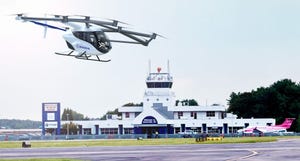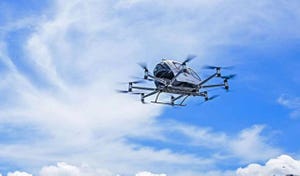Autonomous Ship Startup Raises $55M
Saronic’s autonomous vessels are designed to boost U.S. maritime defense capabilities

Saronic, a startup developing autonomous ships, has raised $55 million in a series A funding round for its maritime defense vessels.
The round was led by Caffeinated Capital, with participation from 8VC, Andreessen Horowitz, Lightspeed Venture Partners, Point72 Ventures, Silent Ventures, Overmatch Ventures, Ensemble VC, Cubit Capital and the U.S. Innovative Technology Fund.
The Austin-based company said the funds will be used to accelerate research and development into its autonomous surface ships, as well as expand in-house manufacturing capacity “for rapid production,” as the company seeks to boost U.S. maritime defense capabilities.
“To outpace China, America must start building a large fleet of autonomous vessels today,” Saronic said in a statement. “Saronic provides a state-of-the-art, purpose-built solution for the United States and its allies…optimiz[ing] autonomous missions, enhancing the range, capability, and survivability of the naval fleet and the warfighter.”
Saronic’s pipeline currently consists of Spyglass, a six-foot vessel, and Cutlass, a 13-foot vessel, both currently in the prototype phase.
Both are equipped with an array of sensors, as well as remotely-updatable software which offers communication even in “GPS-denied environments,” allowing human operators to maintain real-time insight and control of the vessels during missions.
The uncrewed vessels are envisioned as companions to other Navy ships, providing support in a range of use cases including surveillance, reconnaissance and communication.
Spyglass is designed “for tactical deployment, alone or in collaborative swarms, via at-sea launch and recovery from expeditionary craft,” while Cutglass is built to perform “critical roles for the Joint Force, including deploying loitering munitions, connecting communications nodes in adaptive C2 networks, and…tracking other surface craft.”
A third vessel, Corsair, is currently in development, though full details on its specifications have not yet been announced.
The company added that its technology meets an ongoing industry gap, as traditional shipbuilders lack the expertise to build these autonomous vessels.
"America's conventional shipbuilding ecosystem lacks the agility to match the threats posed by our adversaries, and many proposed solutions for the fleet aren't cohesively designed for the mission," said Dino Mavrookas, Saronic’s CEO. "Saronic has worked closely with the Navy to build a solution that meets their requirements.
“We're putting software, autonomy and mission profiles first, reshaping design for rapid production and deployment, and creating a novel breed of autonomous vessels that can meet current and future threats."
Hyundai subsidiary Avikus carried out autonomous navigation of a large ship across the ocean in 2022, becoming the first company to accomplish such a feat. The Avikus navigation system creates optimal routes and speeds based on the Hyundai Global Service Integrated Smartship Solution.
Read more about:
AsiaAbout the Author
You May Also Like








